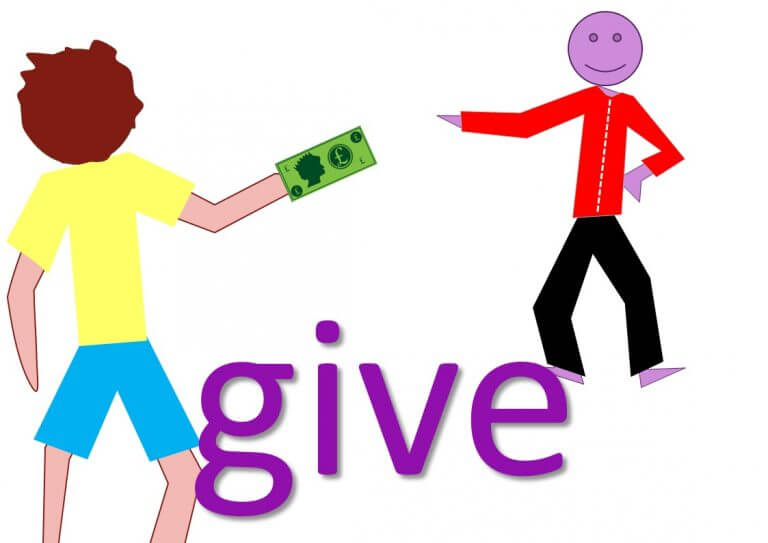AI-Generated Article
This content has been automatically generated using artificial intelligence technology. While we strive for accuracy, please verify important information independently.
There's a phrase making the rounds, something you hear whispered in conversations, see popping up online, and feel, well, just about everywhere: the "give me my money trend." It's not just about actual cash, you know, it's really more of a feeling, a sense that something is owed, or perhaps, a call for what's fair and square. This isn't just a fleeting thought; it reflects a deeper sentiment that many people seem to share, a collective voice asking for what they believe is rightfully theirs.
This idea, this kind of public call for something due, it seems to touch on a very basic human desire for balance and fairness. When we talk about this trend, we're really talking about a whole range of situations where folks feel like they've put something in, whether it's time, effort, or even trust, and now they're looking for the corresponding return. It's a sentiment that, in some respects, speaks to expectations that haven't quite been met, or perhaps, promises that haven't been kept.
So, what exactly lies behind this widespread feeling, this almost universal demand for what's due? We're going to take a closer look at what it truly means to "give," and how that simple act, or the lack of it, can stir up such strong reactions. It’s a way to figure out the different layers of this idea, and why it feels so important to so many people right now, you know, in this moment.
Table of Contents
- What Does It Mean to "Give"?
- The Core Idea Behind the "Give Me My Money Trend"
- When Does the "Give Me My Money Trend" Appear?
- Is the "Give Me My Money Trend" Just About Cash?
- How Does This "Give Me My Money Trend" Feel?
- What Happens When You Don't "Give" What's Expected in the "Give Me My Money Trend"?
- Why Are People Saying "Give Me My Money Trend" Now?
- How Can We Better Respond to the "Give Me My Money Trend"?
What Does It Mean to "Give"?
When we talk about "giving," it’s a word that carries quite a bit of weight, isn't it? At its simplest, to give means to hand over something, to make a present of it, or to supply something to another person. It’s about offering something, perhaps a thing or even a service, to someone else. You are, in a way, passing something into their care or control. For instance, if you were to give a friend a book, you're transferring that item into their keeping. It's a rather straightforward exchange of possession, you see.
But the idea of giving stretches far beyond just physical objects. It can involve providing someone with information, sharing your thoughts, or even extending a greeting. Think about it: when you tell someone some news, you are actually giving them that information. It's a way of communicating, of making something known to another person. This broader sense of giving shows how deeply this word is woven into our daily interactions, encompassing so much more than just material things, you know, like when you offer someone a smile.
The concept also has an interesting side note. Sometimes, the word "give" can refer to a material’s ability to stretch or bend a bit. A fabric that has "give" isn't stiff; it has a certain amount of flexibility. This less common usage, though different, still hints at a sort of yielding or a willingness to adapt. So, it's not just about handing things over, but also about a certain pliability, which is a bit unexpected for the word, really.
The Core Idea Behind the "Give Me My Money Trend"
So, with that broader picture of what "giving" means, we can start to see what's truly at the heart of the "give me my money trend." It's not always a literal request for cash, though it certainly can be. More often, it’s a cry for a kind of fairness, a desire for something that was promised, or perhaps, something that feels earned but hasn't yet arrived. It's about a perceived imbalance, a feeling that one side has contributed, but the expected return has been held back. This feeling, you know, can be pretty strong.
This trend really taps into the idea of an agreement, spoken or unspoken, where one party makes an offering, and the other is expected to provide something in return. When that return doesn't happen, or isn't what was anticipated, that's when this sentiment starts to bubble up. It’s a basic human expectation for things to balance out, for efforts to be recognized, and for commitments to be honored. You could say it’s a call for accountability, in a way, for things to be put right.
It’s a powerful expression because it cuts right to the chase. It strips away polite language and gets straight to the point: there's something that belongs here, and it's not here yet. This directness is part of what makes the "give me my money trend" so noticeable. It’s a clear signal that someone feels they've done their part, and now they're waiting for the other side to do theirs, or perhaps, to supply what's due.
When Does the "Give Me My Money Trend" Appear?
You might notice the "give me my money trend" surfacing in a whole bunch of different situations. Think about when you've put in a lot of hard work at a job, perhaps extra hours, and then your pay doesn't quite reflect that effort, or maybe a bonus you were expecting doesn't show up. That feeling of being short-changed, that's a prime example of where this sentiment can really take hold. It's a situation where you've given your time and energy, and you're looking for the agreed-upon exchange, you know?
It also pops up in consumer experiences. Imagine you've paid for a service, like a repair, and it wasn't done properly, or perhaps a product you bought doesn't work as it should. You've given your funds, and you're expecting a functional item or a job well done in return. When that expectation isn't met, the frustration can lead straight to this kind of demand. It's about the value you expect for what you've supplied, really.
Beyond the obvious financial exchanges, this feeling can also appear in personal relationships. Maybe you've offered a lot of support to a friend, or perhaps listened for hours to their worries, and then when you need a listening ear, they're nowhere to be found. You've given your emotional energy, your time, and you're looking for that reciprocal care. When it feels like the scales are tipped, that's when the "give me my money trend" in a non-monetary sense can really come to the forefront, you see, in a rather personal way.
Is the "Give Me My Money Trend" Just About Cash?
It's a common thought that the "give me my money trend" is only about physical currency, but that's actually not the full picture at all. While money is certainly a big part of it, the underlying principle extends to many other things people value and expect in return for their efforts or contributions. It’s about anything that feels like an investment, a thing you’ve put out there, expecting something back in kind. So, no, it's not just about the dollars and cents, you know.
Consider the idea of giving your time. If you volunteer for a cause, or spend hours helping a family member, you are, in a very real sense, giving a piece of your life. While you might not expect money back, you might hope for appreciation, recognition, or perhaps, simply for the effort to make a positive difference. When that sense of impact or gratitude isn't there, it can feel like your time wasn't valued, almost as if it was taken without a proper return. It’s a subtle but powerful form of the "give me my money trend" playing out.
Or think about trust. When you place your trust in someone, you are offering them a piece of your vulnerability, a belief in their integrity. If that trust is broken, it can feel like something precious has been taken, something that needs to be restored or accounted for. This isn't about physical payment, but about a deep emotional ledger that feels out of balance. It's a call for the return of integrity, or perhaps, for an acknowledgment of the hurt caused, which is, in a way, a demand for what's due, you know, in a rather profound sense.
How Does This "Give Me My Money Trend" Feel?
The feeling behind the "give me my money trend" is often a mix of frustration, disappointment, and a sense of being wronged. It's not a lighthearted request; it usually comes from a place where someone feels their contributions have been overlooked or undervalued. Imagine putting in a lot of effort, perhaps even making sacrifices, only to find that the expected outcome, the just reward, isn't there. That can lead to a really bitter taste, you see.
There's often a strong sense of injustice tied to it. People feel that they have played by the rules, done their part, and now the other side isn't upholding their end of the bargain. This can lead to a feeling of powerlessness, like their voice isn't being heard, or their efforts aren't being seen. It's a call for things to be made right, for the balance to be restored. It’s a very human reaction to perceived unfairness, you know, a sort of primal urge for equity.
Sometimes, this sentiment is also tinged with a feeling of being taken advantage of. If someone has consistently given without receiving what they feel is a fair exchange, it can build up into a strong demand. It's a way of saying, "Enough is enough; I deserve what I've put in." This isn't just about the immediate transaction, but about a pattern of interaction where one party feels consistently at a disadvantage. It’s a pretty intense feeling, actually, when you get down to it.
What Happens When You Don't "Give" What's Expected in the "Give Me My Money Trend"?
When someone doesn't "give" what's expected, particularly in the context of the "give me my money trend," the consequences can range from minor annoyance to significant conflict. On a smaller scale, it might just be a lingering feeling of dissatisfaction, a quiet grumbling. But when the stakes are higher, or the perceived injustice is greater, it can lead to a breakdown in trust and relationships. It’s a pretty big deal, you know, when expectations aren’t met.
In business settings, a failure to supply what was promised can lead to customer complaints, negative reviews, and a damaged reputation. If a company doesn't deliver the product or service that was paid for, or perhaps, if a refund is due but withheld, that's when you hear the loudest calls for what's owed. It impacts the bottom line and the public's perception. It's a clear signal that something needs to be corrected, or else, things can really go south, you see.
In personal interactions, not giving what's expected can strain friendships, create distance in families, and even end relationships. If someone consistently takes without offering anything in return, or fails to uphold their side of an agreement, the person who has been giving will eventually feel drained and resentful. This can lead to a complete withdrawal of support, or perhaps, a direct confrontation where the demand for what's due becomes very clear. It’s a basic human need for reciprocity that, in some respects, keeps our connections strong.
Why Are People Saying "Give Me My Money Trend" Now?
There are a few reasons why the "give me my money trend" seems to be so prominent these days. One big factor is the increased transparency and connectivity that modern life brings. With social media and instant communication, people can quickly share their experiences, both good and bad. If someone feels they've been short-changed, their story can reach a wide audience very quickly, amplifying the sentiment and making it feel more widespread. It's a way of finding collective voice, you know, in a very public way.
Economic pressures also play a part. When times are tough, and every bit of income or value matters, people become more sensitive to anything that feels like a loss or an unfair transaction. The stakes feel higher, and there's less room for error or unfulfilled promises. This can make people quicker to demand what they believe is rightfully theirs, as every penny, or every bit of value, counts more than ever. It’s a very real concern for many, actually.
Furthermore, there's a growing awareness of consumer rights and personal boundaries. People are more informed about what they should expect from businesses and even from personal relationships. This increased knowledge empowers them to speak up when those expectations aren't met. It’s a shift from a more passive acceptance to a more active assertion of what’s fair. This change in attitude, in some respects, fuels the "give me my money trend," making it a powerful expression of personal agency.
How Can We Better Respond to the "Give Me My Money Trend"?
Responding to the "give me my money trend" effectively often starts with clear communication and a willingness to listen. If someone is expressing this sentiment, whether directly or indirectly, it's important to first understand what exactly they feel is owed or missing. Sometimes, it’s not about a literal payment, but about a feeling of disrespect or a lack of acknowledgment. So, asking open-ended questions can help uncover the real issue, you know, rather than just assuming.
For businesses, this means having clear policies regarding returns, refunds, and service guarantees, and then actually sticking to them. When expectations are managed upfront, and there's a straightforward process for addressing concerns, it can prevent the "give me my money trend" from even starting. It’s about building trust by being transparent and reliable, which is, in a way, a form of giving back to your customers.
In personal relationships, it means being mindful of reciprocity. If someone is consistently offering support, time, or emotional energy, it’s important to recognize that and, when possible, offer something in return. This doesn't always have to be a direct exchange; sometimes, simply expressing gratitude or offering a listening ear when it's needed can be enough. It’s about maintaining a balance, a sense of fairness that keeps the connection strong and reduces the likelihood of that "give me my money trend" sentiment cropping up, you see, in a rather healthy way.
🖼️ Related Images



Quick AI Summary
This AI-generated article covers Give Me My Money Trend with comprehensive insights and detailed analysis. The content is designed to provide valuable information while maintaining readability and engagement.
Miss Alice Schamberger DDS
✍️ Article Author
👨💻 Miss Alice Schamberger DDS is a passionate writer and content creator who specializes in creating engaging and informative articles. With expertise in various topics, they bring valuable insights and practical knowledge to every piece of content.
📬 Follow Miss Alice Schamberger DDS
Stay updated with the latest articles and insights